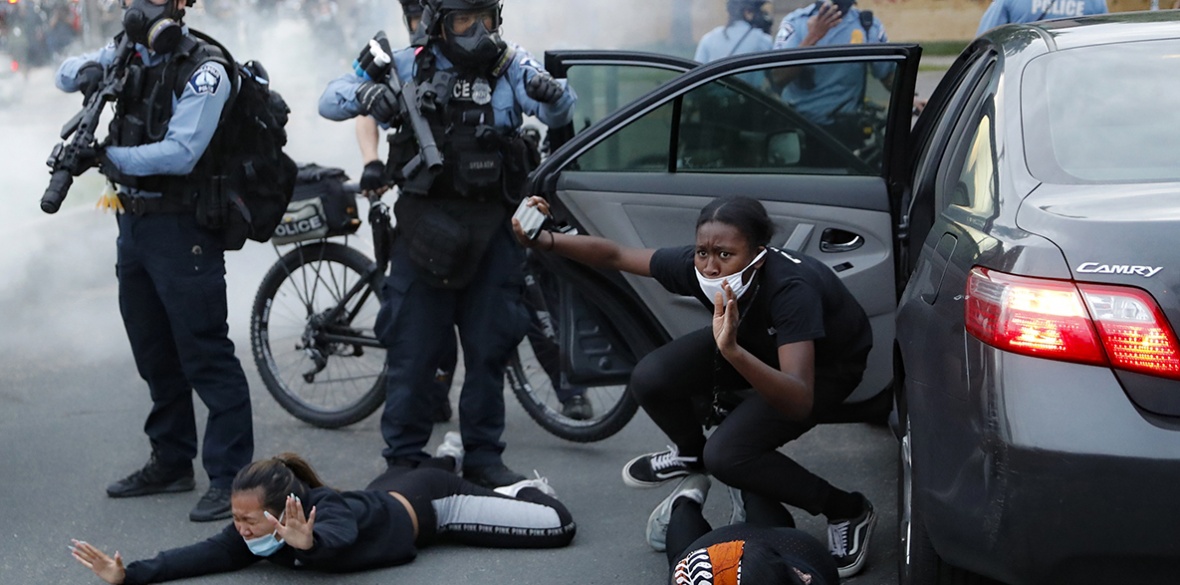This is the last article you can read this month
You can read more article this month
You can read more articles this month
Sorry your limit is up for this month
Reset on:
Please help support the Morning Star by subscribing here
SOCIALISTS around the world are hoping for a change of leader in the forthcoming presidential elections in the US.
Anything but four more years of Donald Trump is a natural feeling when his ghastly record is examined.
But his divisive, unhinged, racist and misogynist policies and behaviours have revealed, rather than caused, the institutional, endemic and structural racism in the US.
Getting rid of Trump also doesn’t mean an end to the turbo-charged economic neoliberal resurgence, combined with populist right-wing regimes appealing to latent nationalist sentiment and racist views.
The pandemic is here to stay and along with it are the consequent clear and present dangers to progressives everywhere.
A world recession is already under way and while the root cause is capitalism unleashed and unequipped to attend to a public health crisis of global proportions, it magnifies the dangers of an increase in racism.
Trump and his mini-clones in countries with similar leaderships around the world have sought to retreat into protectionist economic policies, trade wars, regional military interference and scapegoating migrants.
The numbers of migrants will increase as instability, war, climate change, poverty, hunger and homelessness force more to flee to safe havens.
Trump may well go, but its worth reflecting on the legacy of the previous Obama administration and lack of real progress for people of colour since the civil rights campaigns of the 1960s.
Those campaigns came only 100 years after the abolition of slavery in the US.
And it’s a reminder that so little has changed. Since January 1 2015, 1,252 black people have been shot and killed by police, according to the Washington Post’s database tracking police shootings; that doesn’t even include those who died in police custody or were killed using other methods. Black lives still didn’t matter.
In his speeches as president, Barack Obama did not make more overt references to race relations than his predecessors, but according to one study, he implemented stronger policy action on behalf of African-Americans than any president since the Nixon era.
Following Obama’s election, many pondered the existence of a post-racial United States.
However, lingering racial tensions quickly became apparent, and many African-Americans expressed outrage over what they saw as racist venom directed at Obama’s presidency.
In July 2009, prominent African-American Harvard professor Henry Louis Gates Jnr was arrested at his Cambridge, Massachusetts, home by a local police officer, sparking a controversy after Obama stated that the police acted “stupidly” in handling the incident.
To reduce tensions, Obama invited Gates and the police officer to the White House in what became known as the “Beer Summit.”
Several other incidents during Obama’s presidency sparked outrage in the African-American community, and Obama sought to build trust between the police and civil rights activists.
The acquittal of George Zimmerman following the shooting of Trayvon Martin sparked national outrage, leading to Obama giving a speech in which he noted that “Trayvon Martin could have been me 35 years ago.”
The shooting of Michael Brown in Ferguson, Missouri, sparked a wave of protests six years ago, mirroring recent events in Michigan.
In a January 2010 survey by the Siena Research Institute at Siena College in Loudonville, New York — one year into the Obama presidency — 238 US history and political science professors ranked Obama 15th of 43 US presidents.
A 2011 Gallup poll found that only 5 per cent of Americans saw Obama as the country’s greatest president.
In an April 2013 survey by History News Network (HNN) website in Seattle — four years and three months into the Obama presidency — 203 scholars from 69 top US colleges and universities gave Obama a B- grade on an A–F scale.
A February 2015 Brookings Institution survey of members of the American Political Science Association put Obama in 18th place out of the 43 presidents.
As Obama left office, historians expressed various opinions about his effectiveness as president, with many noting that subsequent events would determine his ultimate legacy.
Despite his personal charm and intellect, his policies didn’t make much difference to the structural racism in the US, they didn’t result in fewer shootings of black people by the police, they didn’t significantly affect inequality and poverty.
Worst of all, he neglected the blue-collar impoverished working class who felt ignored and abandoned by their federal government.
Trump offered them hope, just as Brexit and Boris Johnson addressed the Labour heartland seats which were subsequently lost in 2019.
Joe Biden was part and parcel of the team that created the conditions for a Trump victory in 2016.
The idea that those blue-collar Trump supporters will just turn around and vote Democrat in November is wishful thinking.
And even if they do, it won’t stop white police officers killing black people, as the combination of a deep economic recession and massive unemployment create the conditions for the United States’s bedrock racism to continue to seep to the surface.











